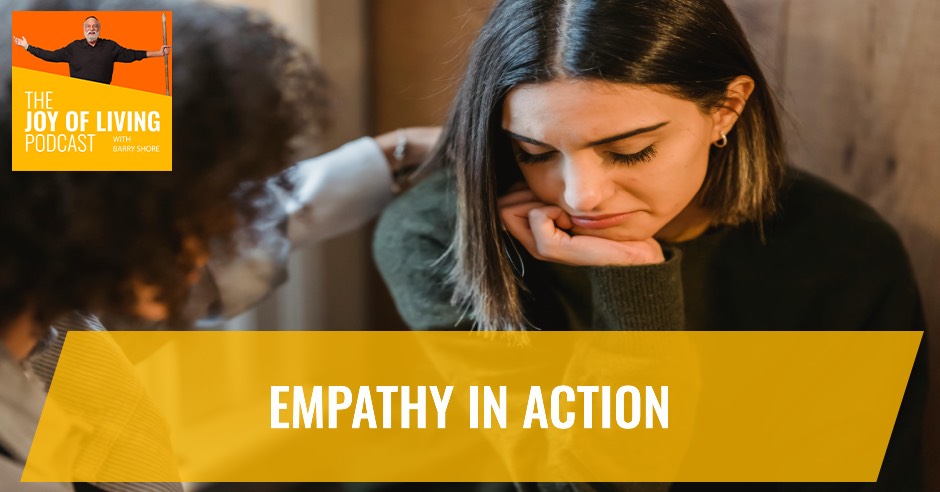Share This Episode

Empathy in Action: How PETA and TeachKind are Changing Lives
In this episode of the podcast, host Barry Shore is joined by Lisbet Chiriboga to explore the impactful work of PETA and TeachKind in promoting human education and fostering empathy in children. Through personal anecdotes and examples, they discuss the importance of teaching responsibility with animals, creating safe spaces for empathy, and fostering inclusive language. They also highlight the power of social media in engaging students and inspiring positive change. Tune in to discover how these programs are shaping young minds and promoting compassion for animals and the planet.
Listen Here (click here to watch episode)
Show Notes:
[10.01] Introducing PETA and TeachKind
- Introduction to PETA and TeachKind
- Overview of PETA’s mission and TeachKind program
- Importance of fostering empathy and compassion through education
- Personal anecdotes illustrating the impact of human education on children’s behavior
- Accessibility of PETA’s resources for promoting human aspects of humanity
[14.22] Impact of Human Education and Reach of PETA
- Impact of Human Education and Reach of PETA
- Examples of fostering empathy in children and addressing antisocial behavior
- Discussion on TeachKind’s reach and impact on teachers and children
- Outreach efforts to parents and children, including the PETA Kids program
[15:00] Teaching Responsibility with Animals
- Educators often bring animals into classrooms to teach responsibility and empathy.
- However, this approach can be problematic, as it may send the message that caring for living beings is only important when convenient.
- Educators should consider the full context and treatment of animals behind the scenes.
- Gen Z students, in particular, have a strong disdain for exploitation and injustice and are interested in topics like the climate crisis.
[20:00] Creating Safe Spaces for Empathy
- Human education creates a safe space for children to show empathy, especially those living in challenging environments.
- Allowing children to practice empathy is crucial for their emotional development.
- Educators can tap into children’s natural empathy by discussing animals’ plight in the world.
[27:30] Fostering Inclusive Language
- TeachKind highlights the importance of using inclusive and respectful language for all beings.
- Simple changes, like adding a separate category for animals in noun lessons, can promote inclusive language.
- Animal-friendly idioms, such as “feed two birds with one scone,” help children replace harmful phrases with more compassionate language.
[33:30] Inspiring Compassion in Young Minds
- Educators can use materials like Animal Rescue Reading Comprehension Sheets to teach about animal welfare.
- Encouraging empathy in children can have a positive impact on their development.
- Teaching compassion for animals is a win-win for everyone involved.
- The TeachKind program aims to raise awareness and inspire noble deeds.
- Educators can integrate human education into their existing curriculum, aligning with academic standards.
- Creating awareness about animal exploitation can empower individuals to take responsibility and make a positive impact.
[40:44] Engaging Students through Social Media
- Social media can be a powerful tool for promoting compassion and awareness.
- TeachKind shares videos of children engaging in compassionate acts, inspiring others to follow suit.
- Encouraging children to create their own animal-friendly idioms fosters creativity and empathy.
[44:20]
- She shares a story of a student who took action after learning about animal exploitation.
- Educators can motivate children to revise and edit their work when they’re passionate about a cause.
- Barry and Lisbet Chiriboga emphasize the importance of teaching kindness and compassion to children.
- They highlight the impact of small actions and the power of one person to make a difference.
[53:00] Promoting Positive Change
- Barry shares acronyms like “DOG POOP” (Doing of Good, Power of One Person) to inspire positive change.
- He encourages listeners to take action, get involved, and find joy in making a difference.
Insider Tips:
Oday joined IBM Consulting as the Global Sustainability leader in August 2023, bringing extensive experience in scaling businesses and a background in management consulting. Before joining IBM, Oday was the Founder & CEO of Better All Round (BAR), a B-Corp certified, innovative, ESG-focused diversified fiber-based business.
Under his leadership, BAR launched Ora Household Towel, a revolutionary product developed from initial concept to market within a year. Prior to launching BAR, Oday worked for over 20 years as a management consultant, starting his career at KPMG before moving to Accenture, where he held various leadership roles. At Accenture, Oday served as Global Head of Media & Entertainment, Global Head of Business Consulting for Communications, Media & High Tech, and Global Go-to-Market Lead of Accenture’s Analytics business.
Throughout his career, Oday has built strong teams and alliances while serving clients worldwide. In addition to his professional achievements, Oday has served as an advisor to several innovative start-ups and as a founding mentor for Henkel X.
Topics Covered:
- What is generative AI and how can it help scale sustainability?
- What will it take to bridge the gap between sustainability aspirations and action?
- What are three things every business leader should know about generative AI?
- How does generative AI help organizations collaborate better?
- Where can our listeners go for more information?
For more information please visit: ibm.com/ibv
Important Links:
About Lisbet Chiriboga
Lisbet Chiriboga is the program manager of People for the Ethical Treatment of Animals’ (PETA) TeachKind program. She creates lessons and activities that aim to foster empathy for animals and are appropriate for even the youngest learners along with other resources for educators interested in humane education. She works directly with school districts, teachers, and homeschooling parents, providing them with free animal-friendly educational materials, and conducts humane education teacher workshops and presentations for administrators. Before joining PETA, she taught in New York City for 12 years.
THIS SHOW BROUGHT TO YOU BY ORGANIFI
use code LIVING for 20% off your next order

